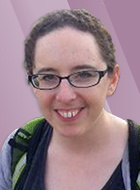
Location
Cambridge, UK
Term of office on council:
2021-2024 First Term
Jennifer Wright leads Cambridge University Press’s (CUP) Research Integrity and Publication Ethics team, and supports Cambridge’s books, journals, higher education programme, and preprint platform in publication ethics best practice. She is also part of Cambridge’s Scholarly Communications Research & Development team and supports a broad range of activities in open research, impact, capacity development, and other research services. Jennifer was previously a postdoctoral researcher in ecology and climate science, and also holds an MBA from Cranfield University.
2023 competing interest statement for Jennifer Wright (PDF)
Getting to know you
An interview with Jennifer Wright
What is your current professional position?
I’m currently Research Services Manager in Cambridge University Press’s Research and Development team. As part of that, I manage our Research Integrity and Publication Ethics team for our Academic division.
What have you been involved in that has led to your position on COPE Council?
My academic background is ecology, focusing on pine savannas and the impacts of drought, climate change, and forest fires. I also recently completed an MBA, which was really helpful in translating some of my academic skills to an applied/business context.
In my publishing career, I started working in Cambridge’s textbook team, before moving into author services, then university liaison, and now R&D/publication ethics and research integrity. I think this broad experience across disciplines and publication formats was a factor in obtaining a position on COPE Council.
What do you think are among the most pressing ethical concerns to address?
I think there’s a real need to improve the communication of corrected and retracted research, though I know there are already initiatives on this in the RISRs project and the newly proposed NISO CORREC Working Group. Another issue is where legal and ethical challenges intersect. We receive many threats of legal action - sometimes just vague threats, others genuine notices of proposed action from lawyers, the majority of which are based on misunderstandings of how scholarly publishing works or the function it serves. For example, authors threatening a journal because of a rejection, or a company demanding we retract or correct an article because people are “misinterpreting” it and they are consequently losing sales to a competitor.
Are there any ethics issues which are unique or more common in your field?
As a humanities and social science publisher, some unique challenges we see at CUP relate to publication ethics principles that generally apply more to STEM sciences than to humanities and social sciences, where aims of the work may actually be to provoke uncomfortable feelings or foster dissent, where research “participants” are unaware they are being “studied”, or where the researcher themselves is a subject. Exploitative or manipulative citation practices also seem more common – where a citation is (re)framed by an author to undermine or alter the cited author’s intentions. General principles of trust, transparency, respect, accountability, critical enquiry apply across disciplines, but how these manifest in policies, practices, and the issues we see are sometimes different.
Do you think there are any particular obstacles or limitations to spreading awareness of ethical standards?
I think education and training are an obstacle for all players – it can make such a huge difference what behaviour is modelled for you by a PhD supervisor, the editor you learn from in your first editing position, the reviews you receive as an author, or the culture you are exposed to as an employee. This isn’t to say people are unethical without training, but there might be no culture or awareness of doing things like declaring competing interests or having respectful authorship conversations early on in a project.
Are there any areas or aspects of your work, or academic publishing in general, that you feel are missing guidelines or standards that you think would be useful?
The first that comes to mind are publication ethics and books, relating to the issue I mentioned earlier about “non-research” misconduct, how to handle “opinion or perspective based” publications, and secondly, some clearer articulation of “meta principles” of publication ethics, such as editorial independence, transparency, fairness/objectivity, preservation of the scholarly record, integrity, consent, respect.
What are you hoping to get your teeth into at COPE? Are there any projects in particular that you would like to get involved in, or any initiatives you have in mind?
I’d like to get involved with the university subcommittee – I think there’s real scope to improve how publishers and institutions work together to foster best practice and tackle issues when they arise, so it would be great to be part of that work.
Photo copyright unknown